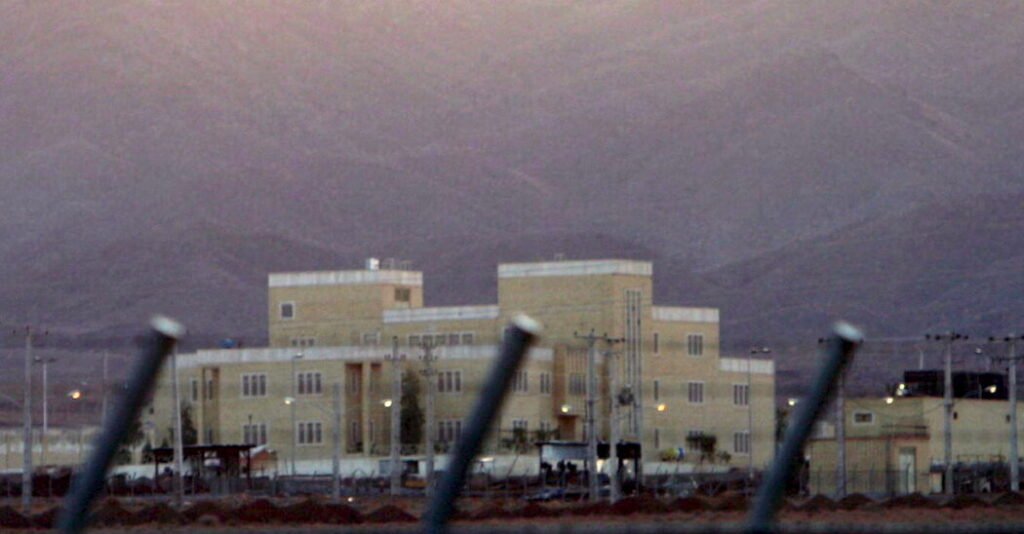The U.N. nuclear watchdog passed a carefully worded resolution on Wednesday condemning Iran for refusing to allow inspectors access to its uranium enrichment program, after the United States toned down its response in an attempt to avoid triggering a crisis at an already turbulent time in the Middle East.
The resolution was proposed by France, Britain and Germany in response to developments in Iran’s nuclear program over the past year and Tehran’s refusal to cooperate with the IAEA. Most estimates suggest that Iran is days to weeks away from being able to produce enough bomb-grade fuel for about three nuclear weapons, but it could take more than a year to actually produce the warheads.
The resolution was passed by a vote of 20 in favor, 12 abstentions and 2 against by the 35-member board of the International Atomic Energy Agency, a United Nations agency. Voting against it were Russia and China. Russia has close security ties with Iran and has purchased Iranian drones for the Ukraine war, while China is a close economic ally that has helped Iran evade sanctions by buying Iranian oil at discount prices.
Nine years ago, Russia and China helped contain Iran’s nuclear capabilities when it agreed to tough limits on its nuclear program in a deal with the Obama administration and European countries. Wednesday’s vote in Vienna made clear how dramatically their positions have changed.
The IAEA’s condemnation resolutions are not legally binding but carry political weight. In November 2022, the board passed a similar resolution drafted by the same three European countries, calling on Iran to cooperate with an investigation into traces of uranium found at a suspected former nuclear facility. Iran did not comply.
But the Biden administration was apparently concerned about avoiding a resolution that was too harshly worded and could provoke a backlash from Tehran. U.S. officials said they shared Europe’s concerns but did not want to support an unenforceable resolution that could provoke an escalation of Iran’s nuclear program as it seeks to de-escalate tensions in the region.
In the end, after some minor revisions to the wording, the United States voted in favor of the resolution.
Iran has long maintained that its nuclear program is peaceful and that it is not pursuing a nuclear weapon, but in recent months senior Iranian officials have publicly said they might reassess their nuclear policy if Iran faced an existential threat from other nuclear powers, specifically Israel and the United States.
Ali Vaez, Iran director for the International Crisis Group, said the resolution adopted Wednesday was sound in principle given long-standing concerns about Iran’s lack of cooperation with U.N. bodies, but it could backfire. “Judging by precedent, Iran is likely to double down on the actions it has been criticized for,” Vaez said.
Iran signaled its displeasure even before the vote took place. Mohammad Eslami, head of the Atomic Energy Organization of Iran, on Tuesday called the resolution “anti-Iran” and politically motivated, and vowed swift retaliation, according to Iranian media.
It was not immediately clear what steps Iran might take, but options include further enriching its uranium, which is currently at 60 percent enrichment, just shy of the 90 percent level conventionally considered weapons-grade fuel, and well above the enrichment level needed to produce fuel for nuclear power generation, typically around 3 percent.
Iran’s interim foreign minister and chief nuclear negotiator, Ali Bagheri Kani, said on Wednesday that the government could “activate” its nuclear capabilities in its national interest, according to a video of his remarks released to Iranian media.
The vote came just two weeks after Iran’s president and foreign minister were killed in a helicopter crash.
Iran and seven of its allies (Russia, China, Belarus, Zimbabwe, Venezuela, Nicaragua and Syria) issued a joint statement condemning the IAEA’s accusations. They said the resolution was ill-conceived and violated diplomatic norms given that Iran is still mourning the deaths of its president and foreign minister. The statement said the resolution would have “counterproductive” effects.
The three-page resolution lists a lengthy list of concerns about Iran’s nuclear program, highlighting in particular the unresolved questions about why traces of uranium were found at two sites that Iran did not declare as part of its nuclear program. The resolution calls on Iran to allow inspectors to take samples and asks the Iranian government to lift a ban on the agency’s major investors from exploring necessary sites in Iran.
Early in his term, the Biden administration tried to negotiate what Secretary of State Antony J. Blinken called a “longer and stronger” version of the 2015 nuclear accord that collapsed when President Donald J. Trump unilaterally withdrew from it in 2018 and imposed harsh economic sanctions on Iran. Experts, including Trump’s own advisers, had told the president that the accord was largely in order.
No new agreement was ultimately reached.

